
The Shivah
Written by: Rik
Date posted: March 13, 2015
- Genre: Adventure
- Developed by: Wadjet Eye Games
- Published by: Wadjet Eye Games
- Year released: 2006
- Our score: 8
In recent years, I’ve started to question whether I actually still like adventure games. Aside from an ongoing and intermittently entertaining engagement with the extremely uneven Broken Sword series, I’d have to go back to Grim Fandango as the last positive adventuring experience in recent memory. Dabbling with Sierra games – even a universally acclaimed title such as Gabriel Knight – left me cold, and though there was moderate unintentional comedy value in the likes of The Mystery of The Druids, it still didn’t readily qualify as enjoyment. Regardless of whether the point and click adventure had actually died or not, my own enthusiasm for the genre has certainly been heading that way.
I’d been dimly aware of a community making games using Adventure Game Studio (AGS) but had lazily dismissed it as a cult of fanatics whose love for all things adventure related had manifested itself in a desire to churn out home-made replacements for the commercial favourites we all knew and loved. And, as someone who was finding it harder and harder to plough through some of those commercial titles, much beloved by others, I didn’t bother to research much further.
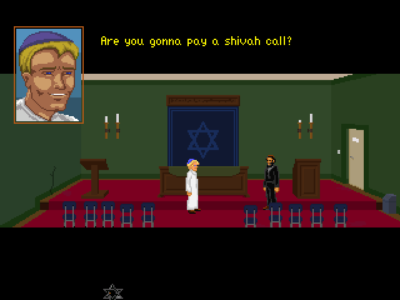
Those ignorant of religion and Judaism in particular will definitely learn something along the way. For example, what a ‘Shivah’ actually is.
Before it was polished up and released for money, The Shivah began life as an entry into a monthly AGS competition (which it won) and since then, a number of other adventures developed with AGS have enjoyed significant commercial and critical success, which goes to show – yet again – that I know nothing. The Shivah had been sitting on my HD for a while after an impulse bundle purchase, although it was actually the announcement of another upgrade and re-release – 2013’s ‘Kosher Edition’ that reminded me that a) I owned this game and b) I needed to give it a go sometime.
The setup is that you are Russell Stone, a New York rabbi faced with mounting bills and minimal attendance at his run-down synagogue. On the verge of packing it all in, he receives a visit from the police, who inform him that a former member of his congregation has been murdered and left him a significant sum of money. When Stone confirms that the two weren’t close and haven’t been in touch in years, the detective identifies him as a prime suspect. Equally stunned by the bequest and the murder, Rabbi Stone decides to investigate.
To say much more would be to give too much away. The Shivah is a short game, most likely due to the restrictions of the original AGS competition (the games had to be developed and completed within a month, and though it was fleshed out a little for the commercial version, it wasn’t expanded into a significantly longer game) and revealing further plot points here would certainly take away from the experience. Much of the enjoyment is in the various details slowly being uncovered by you, the player, and I don’t want to take away from that.
At the time of release, the choice of a rabbi as protagonist garnered some attention, and while it’s certainly original, it’s more about what you do with the character that counts. I could certainly imagine an awful 90s comedy adventure starting a wisecracking rabbi who solves mysteries on the side, with a tone of vague farce and full of misfiring gags of an infantile nature. The Shivah, although not without humour, is a fairly straightforward and serious (and for once ‘serious’ doesn’t mean, as it often does, a desperate and adolescent sprinkling of swearing and violence).
On one level, The Shivah is a simple game about a man trying to solve a murder, but there are subtleties and nuances that are discovered along the way. The storytelling is restrained and low key; things are revealed without it being hammered home that THIS IS IMPORTANT, be it through exposition, flashbacks or cut-scenes. One nice touch, used more than once, is the need to look at e-mail messages – be it your own, or those in the accounts you’ve *ahem* had to hack into along the way – for information. What you’ll find is not just the important clues you need to progress, but also some nice background that helps flesh out the story. I also really liked the fact that hints regarding the mechanics of a major gameplay element (sorry – again, I don’t want to say too much) are dotted throughout: from a hint before the game even begins, then through each and every dialogue option, before a mid-game test, and then the crucial climactic confrontation.
The Shivah is a game of dialogue and clues, rather than picking things up and attempting unlikely combinations in order to negotiate a contrived situation. Although you can look at objects, in most cases you don’t need to, and a single left click to ‘use’ will do the trick. Fans of inventory-based nonsense will find little to satisfy them here – the closest you’ll get to using objects with each other is when you need to combine two related clues.
The low level of difficulty and short length may bother hardcore adventurers too, although I’d like to think most would be able to find something to enjoy here. For me, it actually meant I was eager to dive straight back in and try to access alternative endings (there are three in total) and any other bits and pieces I might have missed first time around. The Kosher Edition also has a number of achievements, a feature that I normally consider rather meaningless, but here they act as a further incentive to fully explore all of the game’s possibilities. Both original and Kosher editions feature (different) commentary tracks, and with the game over in an hour once you know what you’re doing, they’re worth a listen without it meaning a huge investment of time. I even laughed at one or two of the voice acting blooper tracks that become available once you’ve completed the game.Aside from the commentary, the major noticeable difference between the regular and Kosher editions is the graphics (although there are also some changes to the musical score in the latter, too). Either way, visually, it’s a case of 90s retro blockiness all the way (with some different display options to adjust resolution and to smooth things over, as you get with some emulators). I’m not doing the Kosher Edition down, but I quite liked the original visuals, simple as they are, and it isn’t a massive step up from one to the other. According to the developer commentary, the change was necessary to get the graphics at a workable size for mobile ports, and so they figured if they were redoing them they may as well jazz them up a bit – which is fair enough, I guess. Anyway, both are pretty effective, and you get a real sense of each character, allied of course to some strong voice performances, from Rabbi Stone in particular.
The Shivah isn’t perfect, with some rough edges, and repeated plays could certainly invite you to start picking holes in things. But it’s well written, largely gimmick and frustration free, and you enjoy it while you’re playing it. More significantly, there’s a subtlety to the writing that you don’t often see in the rather ham-fisted world of games – it raises questions that it doesn’t feel obliged to answer, and I rather liked that.In fact, I rather liked it in general, and at the end of it all, it has achieved something where many others have failed, because I feel like I might be able to enjoy playing adventure games again. And if that isn’t a recommendation, I don’t know what is. [You know, given that the religious aspect to this game and questions of faith that it raises, a better writer would have found a way to work that into the review – a reader].
*hurried footsteps back towards the room* Hang on, guys, I’ve got one – “The Shivah really RESTORED MY FAITH in adventure games!” Huh? Oh, it’s too late. Right.

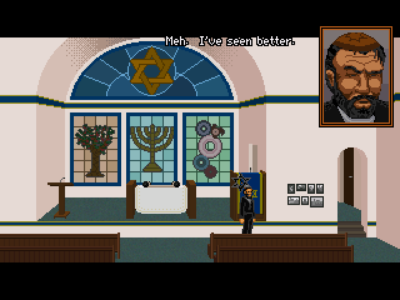
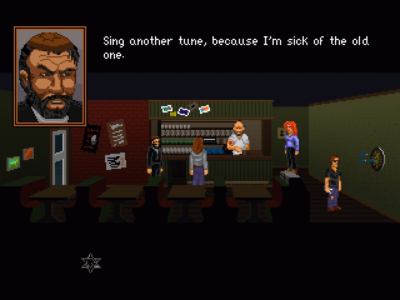
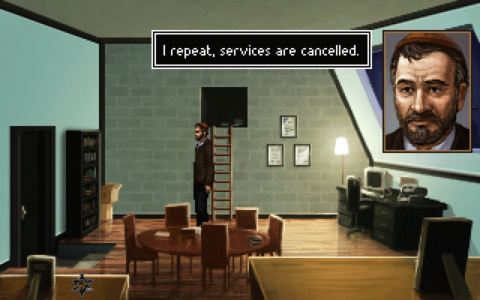
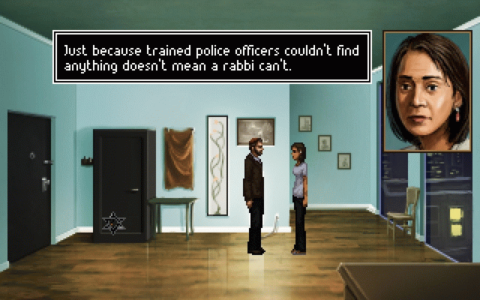

 Posts
Posts
Heck yeah, WadjetEye! You should really give their Blackwell series a shot – I don’t play adventure games that much (I get easily frustrated when I don’t know what am I supposed to do and since figuring out what you are supposed to do is the basis of the genre…), but those I played and had a lot of fun with. The leads, while follow the fairly standard setup of “Butt monkey protagonist and the snarky sidekick” are charming and the plot thicker with each new game, culminating in the fifth and final installment. Don’t let the quantity scare you away, they are, like Shivah, fairly short.
Oh, and one of the characters from Shivah, Sam Durkin, is also in Blackwell..
March 15, 2015 @ 10:35 am
I’d be interested in the Blackwell games, certainly. Who knows when I might get around to it, though.
(A long time, clearly, if it takes me a month to reply to comments. Sorry!)
April 14, 2015 @ 11:46 am